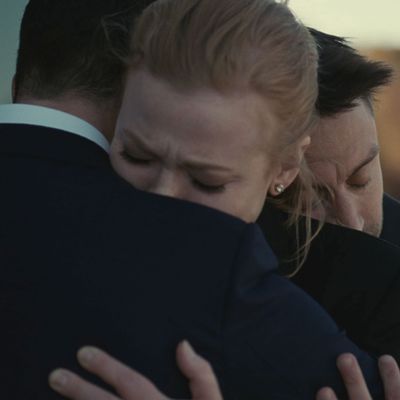
The Succession hive has been eating good lately, thanks in large part to the midseason labor of Nicholas Britell. The HBO series would be unrecognizable without the canonical ching-ching of Britell’s piano melody, the chamber music that sounds straight out of a great hall full of obscenely rich people, and Kendall’s sycophantic “L to the OG” rap, the show’s most genius composition to date. The man who gave us a hip-hop-inflected theme song so nasty there are memes of Kermit the Frog twerking to it is still hard at work scoring upcoming episodes. “It’s interesting getting to see the audience reaction as I’m actually still inside the project,” he told me in an interview ahead of the latest episode drop. “In some ways, it’s kind of nice because it feels like it’s even more of a live experience.”
What kinds of things are you tinkering with as you’re finishing up?
So many things. Each season, I spend so much time writing new ideas. And Jesse Armstrong, the show’s creator, talks to me before he’s even done with episodes. He’ll often give me an outline of what’s gonna happen, but I like not knowing the whole story each season. For example, in season two, I knew some of what was happening, but I didn’t know that Kendall was gonna have that moment at the press conference. I remember watching that episode and being stunned. I think that’s actually really important for me as a composer because so much of what I’m trying to do is feel like I’m watching the show and remember when I get surprised or shocked. It’s important to be sensitive to those emotions as I’m writing.
I can’t imagine being unaware until the moment you get into the studio that Kendall calls his dad a malignant presence on live television. How do you decide where the music goes?
It’s not obvious. I’ll watch a whole episode, and I’ll notate myself. Once I put it all together, I’ll show it to Jesse. He’ll send me notes on things. We have conversations about every single moment.
Did you know about Logan’s death before you saw the finished episode?
I knew about it. Before any of that was shot, I was already writing music and imagining what that might feel like. It led me to a lot of interesting musical questions, like, How might it feel to exist in the world of Succession? In that episode musically, there’s certainly a sense of the passing of this very, very complicated man. Then there’s the feelings of the children. There are times where I feel like I’m writing about the world they’re living in, and I think this feeling comes through in the episode.
When we went into episode three, we thought we were getting wedding shenanigans, jokes, and maneuvering, but then we were delivered this massive, albeit anti-climactic shock that is Logan’s death. How does the instrumentation deal with these dueling vibes? When do you choose silence?
More than any episode I’ve ever worked on with Jesse, this was one where I said we need to spend a lot of time together in my studio working on those sequences. We spent a whole day looking specifically at the phone call. I already had very specific ideas of how I wanted to approach it. That sequence is unlike any other music in the whole series. Often for Succession I’m writing music that, in its structure, is a complete piece; for that sequence, I focused on the emotional POV of the children instead. There’s actually these very rough-hewn string tremolos that have bowings of raw sounds and they’re bent a little bit. There’s also a wobble to the sound. It’s kind of wavy. There is this sense that it’s a moment in any human being’s life when the unexpected happens. I feel like those moments distort your reality, and I wanted the music to do that too. The performances of Jeremy Strong and Sarah Snook and Kieran Culkin are just stunning to me. I was so moved by them, and I remember wanting the music to be a part of the beautiful work they were doing.
The feeling that there’s an irrevocable change reminded me of the score for season three’s end credits. That piano-heavy melody and powerful Baroque choir felt like the second coming of Logan Roy and a new reality for the kids, while this episode is an even greater turning point. When scoring the Roy family’s life-changing moments, how does the initial vision match up with what the audience hears?
There’s this wider range of things that you come up with because you don’t know exactly how the episode will look. When you see the images, immediately you say to yourself, Actually, maybe it should be this instead. There’s a piece of music I wrote when imagining Logan’s passing before I saw the episode. That piece didn’t work in the sequences when they’re talking over the phone because emotionally it says something very different. We put it at the end of the episode because there’s more of a sense that everything is done. When you put something in the end credits, there’s a sense that that chapter has closed, whereas if it’s in the episode itself, it’s still a question mark. Even though everything about the music in that episode is different from Succession, I still wanted it to be Succession. So the actual chords that those strings are playing are from the show, but during the phone call, they have more dissonance than they normally do.
Let’s talk about that dissonant triplet that appears in the main theme, that ching-ching sound. When do you decide to use it in the episodes? That weird, windy melody has now become part of the structure of what I’m doing with the score. I often try to reimagine it each season. For example, in the piano melody in the elegy piece at the end of episode three, you hear that same theme played on the strings in a new way. Logan is so central to so much of the show, and there’s something about these chords with that melody that has his imprint on them. He’s the founder of Waystar Royco; he’s the father figure. But at the same time, I try not to have these notes be about any one character. With season four, I’m trying to write so many new things, but if I do bring those things in, I try to weave them in a way that feels like the music is self-aware.
In the latest episode, Kendall listens to Jay-Z’s “Takeover” on his way to Waystar for his first day as co-CEO, a moment that parallels Kendall’s introduction from way back in the day. Then the diegetic music cuts out and we hear this little hip-hop-inspired bit as he walks into the building. Is that something you made?
That beat is mine. There are times, like in the main theme, that I’m using hip-hop drums. The idea of hip-hop around Kendall is something I have explored at various points when it felt right for the show. We’ve used hip-hop occasionally with Roman; there’s that beat when he forays into the football club. The beat at the beginning of the latest episode is mine. There’s no sample in it. There’s a parallel to the Jay-Z intro, and when you have Kendall walking up to the building, there’s a sense that this is his own moment. He has a sense of himself. His listening to hip-hop is a way to reinforce his confidence at times. We see that in the pilot episode, too.
As for Tom and Shiv, the music sounds so mournful this season. How do you score them?
The Tom-Shiv relationship is another one of those story lines I thought about a lot before I saw those cut episodes. There is a deep pain in their relationship, yet at the same time, their relationship is constantly unfolding in different ways. I think it’s important to keep an openness to things and where they stand. There’s an ever-unfolding pathos in all these different directions for them. I think the music this season for them is an evolution in the sound that we’re used to.
Did you sneak anything into the music this season, any Easter eggs we should pay attention to? Do we need to get some nice Kendall-level headphones?
There’s always a lot. I think we should talk again at the end of the season. There’s a lot to come.
This interview has been edited and condensed for clarity.


